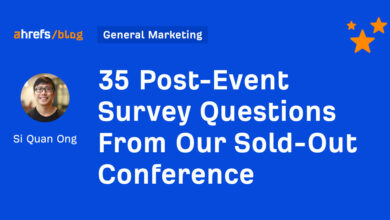The Ultimate Guide That Cost $300k to Make

Events can be a powerful tool in a company’s marketing strategy. They provide a unique opportunity to connect with customers, build brand awareness, and generate leads. However, organizing a successful event requires careful planning and execution. In this article, we will delve into the world of event marketing, with a focus on organizing a multi-day conference.
Ahrefs Evolve was a prime example of a successful conference that brought together 500 attendees for a week of workshops, networking events, and panel discussions. The event was a culmination of months of planning and coordination by the events marketing team led by Shermin Lim. Despite the challenges of organizing a large-scale event with a small team, Ahrefs Evolve was a resounding success.
Event marketing is the process of planning and organizing an event to promote a brand, product, or service. Events can vary in size and format, from small meetups to large conferences. The goal of event marketing is to create a memorable experience for attendees and generate interest in the company or its offerings.
One of the key reasons for organizing events is to create a personal connection with customers. In a world where most interactions are digital, face-to-face events provide a valuable opportunity to engage with customers on a more personal level. Events also allow companies to showcase their products or services, educate customers, and network with industry professionals.
Before embarking on organizing an event, it is essential to define clear goals and objectives. What are you trying to achieve with the event? Are you looking to generate leads, build brand awareness, or educate customers about new products? Setting specific goals will help guide the planning process and ensure that the event aligns with your overall marketing strategy.
In addition to setting goals, it is crucial to identify your target audience. Who are you trying to reach with the event? Understanding your target audience will help determine the format and content of the event. For example, if you are targeting industry professionals, you may want to invite expert speakers and host networking sessions. On the other hand, if you are targeting consumers, you may focus on product demonstrations and interactive activities.
Another important consideration in event marketing is budgeting. Organizing an event can be costly, so it is essential to allocate resources wisely. Consider factors such as venue rental, catering, staffing, and promotional materials when creating a budget for the event. It may also be beneficial to explore sponsorship opportunities or partnerships to offset costs.
In conclusion, event marketing can be a powerful tool for companies looking to engage with customers and promote their brand. By carefully planning and executing an event, businesses can create a memorable experience for attendees and achieve their marketing goals. Whether organizing a small meetup or a large conference, the key to success lies in setting clear goals, understanding the target audience, and managing resources effectively. With the right strategy and execution, events can be a valuable addition to any company’s marketing toolkit. Creating a successful event requires careful planning and consideration of various factors. One crucial aspect to consider is the lineup of speakers and topics that will be discussed at the event. This not only attracts attendees but also helps sponsors decide if they want to be a part of it.
In the case of Ahrefs Evolve, the decision was made to bring together top digital marketing professionals, not just limited to SEOs. This strategic choice influenced the selection of speakers who covered a range of topics including account-based marketing, performance branding, and TikTok. By diversifying the content and speakers, the event aimed to appeal to a broader audience and provide valuable insights across different areas of digital marketing.
However, organizing a successful event like Ahrefs Evolve did not happen overnight. It was a gradual process that involved starting with sponsoring events, hosting networking gatherings, and gradually expanding to workshops and smaller conferences. This incremental approach allowed the organizers to build a strong foundation, establish credibility, and test the waters before scaling up to a larger event.
One key lesson learned from the journey to Ahrefs Evolve was the importance of building a realistic budget. Developing a budget involves identifying all necessary expenses such as venue rental, catering, speaker fees, A/V equipment, marketing, and more. By estimating costs and revenue sources, organizers can ensure that the event remains financially sustainable and delivers a positive return on investment.
Negotiation also plays a crucial role in managing costs and maximizing resources. By engaging in discussions with vendors and service providers, organizers can potentially reduce expenses and secure better deals, ultimately optimizing the budget and ensuring the event’s success.
Ultimately, the success of an event lies in meticulous planning, strategic decision-making, and effective execution. By focusing on creating valuable content, engaging speakers, and a well-thought-out budget, organizers can attract attendees, entice sponsors, and deliver a memorable experience for all participants. Ahrefs Evolve serves as a testament to the power of thoughtful event planning and the impact it can have on the success of a conference. When planning a large event such as a conference, there are many factors to consider in order to ensure its success. One of the key aspects of event planning is managing revenue streams and expenses. In this article, we will discuss some of the important considerations when it comes to generating revenue for your event.
One common challenge that event planners face is the issue of lost revenue due to space holds. In the case of holding a large venue for one night, the hotel may consider it as lost revenue since the space could have been rented out for a wedding. However, it is important to carefully review all charges and fees associated with venue rental and negotiate any unnecessary costs.
Ticket sales are a major source of revenue for events. When determining ticket prices, it is important to strike a balance between covering costs and attracting attendees. Offering early bird discounts and bulk purchase options can help incentivize attendees to commit early. Additionally, creating tiered ticket options, such as VIP packages, can provide added value for attendees willing to pay a premium.
Sponsors are another important revenue stream for events. Companies or individuals may pay to have their branding featured at the event, along with potential speaking opportunities and booth space. Securing sponsors can help offset costs and increase overall revenue for the event.
Grants are another potential source of revenue for events. Checking for government or other grants specifically for event organizers can help supplement funding and support the success of the event. While not all grant applications may be successful, it is worth exploring this option to maximize revenue potential.
Event budgeting is crucial for ensuring the financial success of the event. It is important to set realistic budget goals and forecast expenses accurately. Starting small and gradually scaling up can help event organizers gain a better understanding of costs and pricing strategies.
Choosing dates and venues for the event are also critical factors in revenue generation. Selecting dates that do not conflict with major holidays or events, and choosing a venue that is easily accessible and meets the needs of attendees are important considerations. Factors such as venue availability, size, rates, aesthetics, amenities, and services should all be taken into account when selecting a venue.
In conclusion, managing revenue streams and expenses effectively is essential for the success of any event. By carefully considering ticket sales, sponsorships, grants, and budgeting, event organizers can maximize revenue potential and ensure a successful and profitable event. Planning and executing a successful event, especially one geared towards Gen Z attendees, can be a daunting task. From finding the right venue to securing top-notch speakers and promoting the event effectively, there are numerous factors to consider. In this article, we will delve into the meticulous planning process of organizing a conference that caters to 500 people, with a special focus on the importance of LED walls and the overall event experience.
When it comes to selecting a venue for a large-scale event, the availability of an LED wall can significantly enhance the visual appeal and engagement of the attendees. LED walls offer a dynamic and immersive backdrop for presentations, performances, and interactive elements, making them a popular choice for modern events. In the case of organizing a conference for Gen Z participants, having an LED wall can create a high-tech and vibrant atmosphere that resonates with their digital-native preferences.
Finding a venue that can accommodate 500 people can be a challenge, especially in a city like Singapore where most venues cater to smaller or larger crowds. Conducting thorough research and site visits are essential steps in narrowing down the options and ensuring that the chosen venue meets all the necessary criteria. In the case of the event planner mentioned in the article, a combination of online communication with venue representatives and in-person site visits helped in selecting the ideal venue for the conference.
Communication and responsiveness from venue staff are crucial aspects to consider when planning an event. Delayed responses and lack of professionalism can be red flags that may indicate potential issues during the event planning process. Working with a venue that is prompt, efficient, and attentive to your needs can streamline the planning process and ensure a smooth execution on the day of the event.
In addition to venue selection, securing top-notch speakers is another key element in the success of an event. High-profile speakers can attract attendees and add credibility to the conference. In the case of the conference discussed in the article, renowned industry experts were invited to speak, along with internal team members who could provide valuable insights and expertise. By curating a diverse lineup of speakers, the event organizers were able to offer a well-rounded and engaging program for the attendees.
Event promotions play a crucial role in attracting attendees and generating buzz around the conference. Utilizing various marketing channels, such as early bird discounts, event landing pages, owned media platforms, speaker cards, and video tours, can help increase visibility and drive ticket sales. Engaging with the target audience through personalized messages and visually appealing content can create excitement and anticipation for the event.
Overall, organizing a successful event for Gen Z attendees requires meticulous planning, attention to detail, and a focus on creating a memorable experience. By incorporating elements such as LED walls, top-notch speakers, effective communication with venues, and strategic event promotions, event planners can ensure a seamless and engaging conference that resonates with the target audience. Planning and executing a successful conference requires a lot of work and attention to detail. The Ahrefs Evolve Conference is a prime example of how to create a buzz around an event and ensure its success. From creating compelling content to advertising balloons and promoting the conference at other events, the team at Ahrefs left no stone unturned in their marketing efforts.
One of the key strategies they employed was creating engaging content targeted at specific keywords related to conferences. By using Keywords Explorer, they were able to identify high-ranking keywords and create blog posts around them. This not only helped increase visibility for the conference but also attracted the right audience.
In addition to content creation, the team at Ahrefs took a bold approach to marketing by using a giant helium balloon as their conference ad creative. This unique tactic helped grab attention and set the conference apart from others in the industry.
Promoting the conference at other Ahrefs events and running paid advertising on Facebook and Instagram were also key components of their marketing strategy. By consistently building FOMO and creating graphics to showcase attendees, they were able to generate excitement and interest in the event.
When it came to securing sponsors, Ahrefs kept things simple by offering one tier to all sponsors. This included exhibition booths, social media visibility, onsite branding, and complimentary event tickets. By providing clear benefits to sponsors, they were able to attract valuable partnerships.
In terms of event execution, Ahrefs partnered with an events agency to handle the logistics, such as A/V, lighting, production management, and event registration. They also hired a photo and videography team to capture the event and ensure a seamless experience for attendees.
Despite meticulous planning, the team at Ahrefs had to contend with unexpected challenges during the event. This serves as a reminder that no matter how well-prepared you are, things can still go wrong. Being able to adapt and resolve issues on the spot is crucial for ensuring a successful event.
In the aftermath of the conference, it’s important to gather feedback from attendees, sponsors, and your team. By soliciting feedback through surveys and debriefing sessions, you can identify areas for improvement and make necessary adjustments for future events.
Overall, the Ahrefs Evolve Conference serves as a testament to the power of effective marketing and meticulous event planning. By employing a combination of creative strategies and attention to detail, they were able to create a memorable and successful conference experience.
The Importance of Concurrent Planning in Event Organization
Introduction
Organizing an event involves a multitude of tasks that must be handled simultaneously. Besides the actual event execution, most of what happens occurs concurrently. This means that even as decisions are being made about the venue, other aspects of the event such as reaching out to speakers and sponsors, creating marketing assets, finalizing logistics, and designing materials should already be in progress.
The Details Matter
There are countless details that go into organizing an event, many of which are crucial to its success. For example, some attendees may require assistance with visa applications in order to attend. In such cases, providing a template or guidelines for visa application can be a helpful resource for attendees.
Expertise is Key
Organizing a successful event requires a high level of expertise and attention to detail. Individuals like Shermin, who possess a wealth of experience in event planning, are invaluable assets in ensuring that all aspects of the event run smoothly. Their knowledge and expertise can make a significant difference in the success of the event.
Achieving Goals
Despite the challenges involved in event planning, with careful concurrent planning and attention to detail, goals can be achieved. Whether it’s reaching a target number of attendees, securing key sponsors, or creating a memorable experience for participants, effective event organization can lead to successful outcomes.
FAQs
1. How can concurrent planning benefit event organization?
Concurrent planning allows for multiple tasks to be completed simultaneously, saving time and ensuring that all aspects of the event are well-coordinated.
2. What are some common challenges in event organization?
Common challenges in event organization include managing logistics, securing sponsors, coordinating with speakers, and ensuring a seamless attendee experience.
3. Why is expertise important in event planning?
Expertise in event planning is crucial for navigating the complexities of organizing an event, ensuring that all details are carefully considered and executed effectively.
4. How can event organizers assist attendees with visa applications?
Event organizers can provide templates or guidelines for visa applications to assist attendees who require visas to attend the event.
5. What role do goals play in event organization?
Goals help to provide a clear direction and focus for event organizers, guiding their efforts and measuring the success of the event.
the topic of “The Benefits of Meditation for Mental Health”.
Meditation has been practiced for centuries as a way to improve mental, emotional, and physical well-being. In recent years, there has been a growing body of research supporting the benefits of meditation for mental health. From reducing anxiety and stress to improving focus and attention, the practice of meditation has shown to have a wide range of positive effects on mental health.
One of the key benefits of meditation is its ability to reduce stress and anxiety. In today’s fast-paced world, many people are constantly bombarded with stressors that can take a toll on their mental health. Studies have shown that regular meditation practice can help to lower levels of the stress hormone cortisol, leading to decreased feelings of anxiety and overall improvement in mood.
Furthermore, meditation has been found to be an effective tool for managing symptoms of depression. By focusing on the present moment and developing mindfulness, individuals can learn to let go of negative thoughts and emotions that contribute to feelings of sadness and hopelessness. Through regular meditation practice, individuals can cultivate a more positive outlook on life and improve their overall mental well-being.
In addition to reducing stress and anxiety, meditation has also been shown to improve focus and attention. In a world filled with distractions, many people struggle to maintain their focus and stay present in the moment. By practicing meditation, individuals can train their minds to become more focused and attentive, leading to improved cognitive function and a greater sense of clarity.
Moreover, meditation has been found to enhance self-awareness and promote self-compassion. By taking the time to sit quietly and observe their thoughts and emotions, individuals can gain a deeper understanding of themselves and develop greater self-acceptance. This increased self-awareness can lead to improved relationships with others and a greater sense of empathy and compassion towards oneself and others.
Overall, the benefits of meditation for mental health are vast and well-documented. By incorporating regular meditation practice into their daily routine, individuals can experience decreased stress and anxiety, improved focus and attention, and enhanced self-awareness and self-compassion. Whether practiced alone or in conjunction with therapy and medication, meditation can be a powerful tool for improving mental well-being and achieving a greater sense of peace and balance in life. the topic of mental health in the workplace and the importance of creating a supportive environment for employees.
Mental health is a significant issue in the workplace that is often overlooked or not given enough attention. The World Health Organization estimates that mental health disorders affect one in four people at some point in their lives, making it a common and widespread concern. In the workplace, mental health issues can manifest in various ways, such as stress, anxiety, depression, burnout, and more serious conditions like bipolar disorder or schizophrenia.
Creating a supportive environment for employees is crucial for promoting mental well-being in the workplace. When employees feel supported and valued, they are more likely to feel motivated, engaged, and productive. On the other hand, a toxic work environment can exacerbate mental health issues and lead to decreased job satisfaction, increased absenteeism, and higher turnover rates.
There are several ways that employers can create a supportive environment for mental health in the workplace. One of the most important aspects is to promote open communication and destigmatize mental health issues. Employees should feel comfortable talking about their mental health concerns without fear of judgment or discrimination. Employers can provide resources such as Employee Assistance Programs (EAPs) or mental health training to help employees cope with stress and seek help when needed.
Another important factor in creating a supportive environment for mental health is promoting work-life balance. Long hours, high workloads, and a lack of flexibility can contribute to stress and burnout. Employers should encourage employees to take breaks, use their vacation time, and prioritize self-care. Implementing policies that support flexible work arrangements, such as telecommuting or flexible hours, can also help employees manage their mental health.
Additionally, promoting a culture of respect and inclusivity can have a positive impact on mental health in the workplace. Bullying, harassment, and discrimination can all contribute to stress and anxiety. Employers should have zero tolerance policies for such behavior and provide training on diversity and inclusion to promote a positive and inclusive work environment.
Ultimately, creating a supportive environment for mental health in the workplace is not only beneficial for employees, but also for the overall success of the organization. When employees feel supported and valued, they are more likely to be engaged, motivated, and productive. By prioritizing mental health in the workplace, employers can create a positive and healthy work environment that benefits everyone involved.




